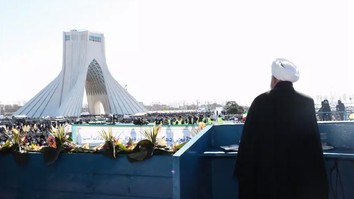TEHRAN -- The Iranian regime Sunday (February 9) made a number of unverified claims of advancements in its missile technology only to be followed shorty by the dramatic failure of a highly anticipated satellite launch.
On Sunday, Iranian forces launched the Zafar satellite at 7.15pm, but it fell short of reaching orbit, the Defence Ministry said.
A ministry spokesman said initially that the satellite was "successfully" launched and went "90% of the way", reaching an altitude of 540km.
"Unfortunately, in the final moments the carrier did not reach the required speed" to put it into orbit, he told state television.
![A Salaam Times cartoon depicts the Iranian leadership fawning over new and expensive rocket technology while ordinary Iranians languish in poverty. [Salaam Times]](/cnmi_st/images/2020/02/10/22367-rocket_caricature__1___1_-585_329.jpg)
A Salaam Times cartoon depicts the Iranian leadership fawning over new and expensive rocket technology while ordinary Iranians languish in poverty. [Salaam Times]
Telecommunications Minister Mohammad Javad Azari Jahromi admitted in an English-language tweet soon after that the launch had "failed".
"But We're UNSTOPPABLE! We have more Upcoming Great Iranian Satellites!" said Jahromi.
The launch failure is a significant blow to Tehran's space programme that members of the international community call a cover for missile development.
In January 2019, Tehran announced that its Payam -- "Message" in Farsi -- satellite had failed to reach orbit, after authorities said they launched it to collect data on the environment in Iran.
The launch of the carrier rocket violated a 2015 United Nations Security Council resolution endorsing the international accord on curbing Tehran's nuclear programme, said the United States.
Resolution 2231 called on Tehran to refrain from any activity related to ballistic missiles capable of delivering nuclear weapons.
'New generation' of engines
The launch failure came only hours after the Iranian military made a number of dubious claims of missile technology advancement.
The Islamic Revolutionary Guard Corps (IRGC), which was designated as a terrorist organisation last April, also unveiled Sunday a short-range ballistic missile that it said could be powered by a "new generation" of engines designed to put satellites into orbit.
The Raad-500 missile was equipped with new Zoheir engines made of composite materials lighter than on earlier steel models, said the IRGC.
It also unveiled Salman engines made of the same materials but with a "movable nozzle" for the delivery of satellites into space.
IRGC commander Maj. Gen. Hossein Salami unveiled the missile and engines alongside IRGC aerospace chief Brig. Gen. Amirali Hajizadeh.
The movable nozzle on the new engine allowed "manoeuvrability beyond the atmosphere" and amounted to a "leap in modern missile technology", said Salami.
Iranians don't want more rockets
These new developments come after a traumatic period for the Iranian regime in which unprecedented anti-government protests swept across the country.
Faced with an increasingly disaffected population and a plummeting economy, Iranian leaders are scrambling to maintain control while at the same time posturing to appear tough against the West.
There is an undercurrent of rage directed at Iran's persistent economic woes, and news of the IRGC squandering vast sums on missile technology rather than helping the teetering economy undoubtedly will sour public sentiment toward the Iranian leadership.
These economic troubles and the internal unrest caused by them may be tempering the Iranian regime's willingness to confront the West in the showdown following the killing of Maj. Gen. Qasem Soleimani.
Soleimani was killed by a US drone strike in Baghdad January 3.

![A picture of the rocket carrying an Iranian satellite launching on February 9. The rocket failed to make it into orbit. [Iranian Ministry of Defence]](/cnmi_st/images/2020/02/10/22369-iranrocket-585_329.jpg)







To be honest, I learned about Iran's evil tricks against Afghanistan and the rest of the world through Salaam Times' reports. Before this, I did not know about it. Iran and Pakistan are safe havens of terror, both countries need to be disintegrated and their existing evil systems need to be dismissed.
Reply3 Comment
Iranian regime should be overthrown, because it is the most dictator regime in the world. it spends all of the country wealth on nuclear weapons and terrorists in the regions.
Reply3 Comment
The people of Iran should raise their voice against the government. They spend all the money on nuclear energy. Iran's economy is deteriorating day by day.
Reply3 Comment